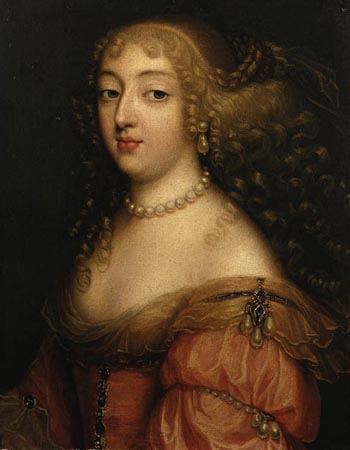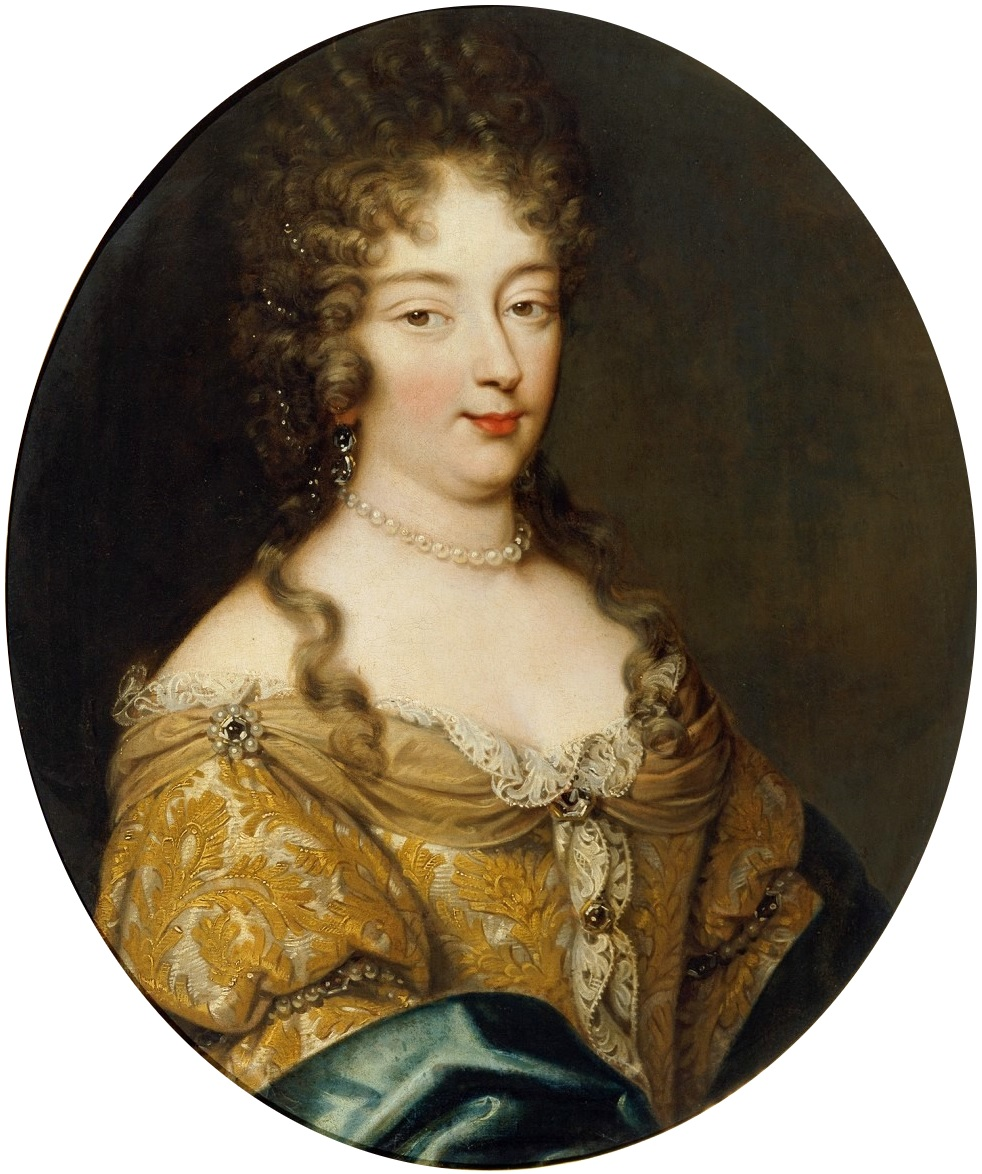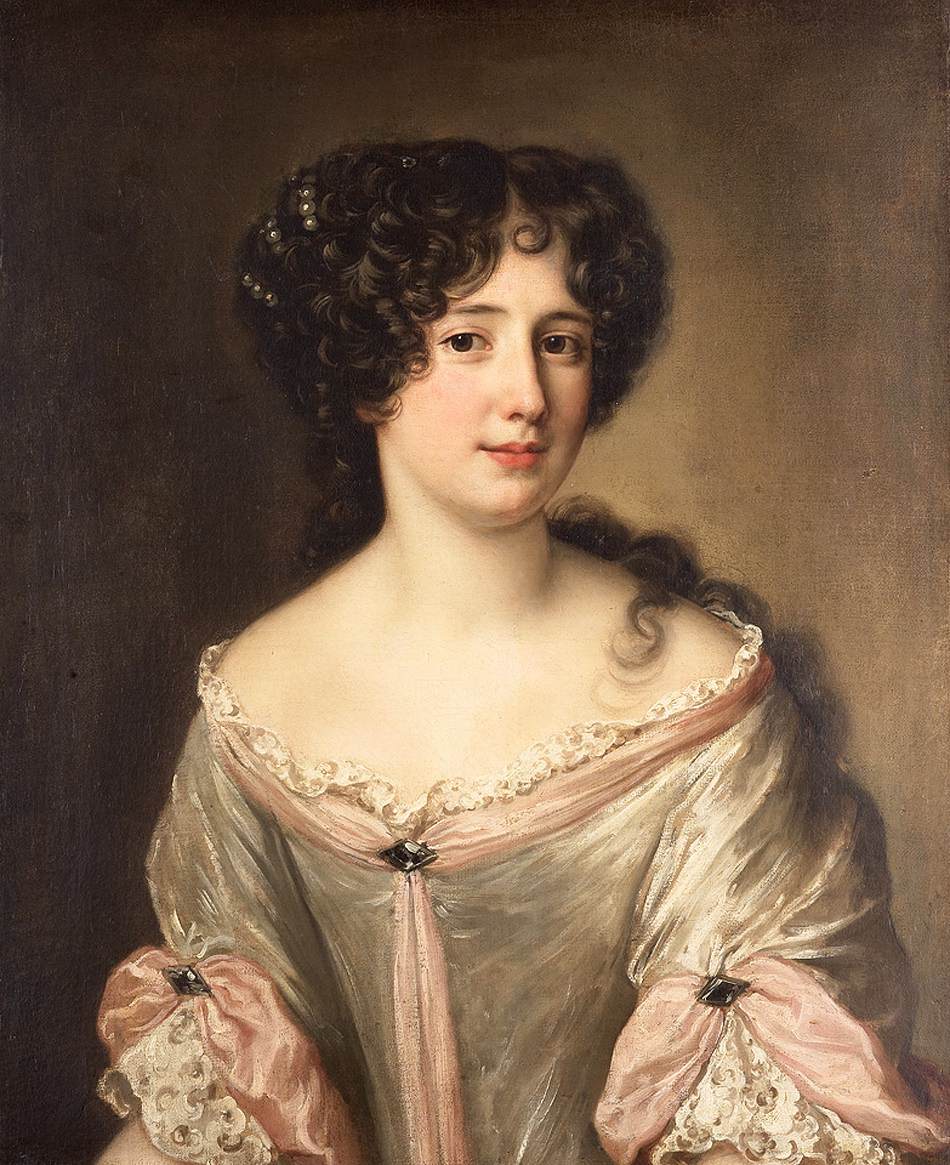Cardinal Mazarin served Louis XIV as prime minister both during and after the tumultuous Fronde-years. Once the civil war had been won the Cardinal set about consolidating his power at court. This partially included his own personal prestige but also that of his family. Luckily for him, his family boasted of several young, beautiful women who were just ripe for the marriage market.
In total, the Cardinal had seven brides to marry off as advantageously as possible. In 1647 he summoned his sister, Laura Margherita Mazzarini to France and included her daughters, Laura and Anne Marie Martinozzi.
His other sister, Girolama Mazzarini, had wedded the Italian Baron Lorenzo Mancini. Their union had produced no less than ten children; amongst those that survived childhood there were five girls: Laura Mancini, Hortense, Olympia, Marie and Marie Anne Mancini.
At court these seven young women were known as the Mazarinettes. They were introduced to Anne of Austria who took personal interest in the education and well-being of the young ladies.
For the time being they were installed in the royal court while their uncle searched for suitably powerful men to marry them off to - and he succeeded.
The first to walk down the aisle was Laura Mancini. In 1651 she married Louis de Bourbon, Duc de Mercæur. This awarded her the right to be titled Serene Highness since she had married a legitimised prince. Their marriage was a success in more than one way. Both became very fond of each other and they soon produced three sons - including the Duc de Vendôme who later became a famous military leader.
 |
| Laura Mancini |
Anne Marie Martinozzi gained a very prestigious marriage in 1654 when she was wedded to Armand de Bourbon, Prince de Conti. By this marriage she took precedence over her cousin, Laura Mancini, since the Prince de Conti was a Prince of the Blood whereas the Duc de Mercæur had been legitimised. She had three children but died already at the age of 35.
 |
| Anne Marie Martinozzi |
Laura Martinozzi was sent back to Italy in 1655 where she married Alfonso IV d'Este, thus becoming Duchess of Modena. If Cardinal Mazarin had been alive in 1685 he would have witnessed her daughter becoming Queen of England by marriage to James II. When her husband died in 1662 she took the role of regent.
 |
| Laura Martinozzi |
The next in line was Olympia Mancini who - like Laura Mancini - remained at the French court. Unlike her sister, she married a prince étrangere or a foreign prince. In 1657 she was married to Prince Eugène-Maurice of Savoy, Comte de Soissons. While at court she was known as Madame la Comtesse. Olympia was said to be less attractive than her sister but possessing such a personal charm that she made up for it. Unfortunately, she had a pendant for intrigue. When Louis XIV and Henriette d'Orléans sought to dispel the rumours that they were lovers, they engaged Madame la Comtesse to find a decoy. She did excellently and came up with a certain Louise de La Vallière.
She would later become the king's mistress herself for a brief period only to be abandoned by the monarch again. Her career at court came to a crashing halt when she was accused of having conspired with La Voisin to poison La Vallière during the Affair of the Poisons. Olympia was exiled and she died in Brussels.
 |
| Olympia Mancini |
1661 saw the marriages of two Mazarinettes: Hortense and Marie Mancini.
Hortense Mancini could have become Queen of England. In 1659 Charles II proposed to her but was rejected by her capricious uncle. At the time Charles was still in exile and his prospects of becoming king were uncertain. Instead, she was married off to one of the richest men in Europe: Armand Charles de La Porte de La Meilleraye. The couple were granted the title of Duc and Duchesse de Mazarin upon their marriage.
Sadly, Hortense quickly discovered that her husband was not only violent but mentally unstable. Despite their unhappy union they managed to produce four children; nevertheless, Hortense had to leave them behind when her husband's behaviour became so erratic that she had to flee. Both Louis XIV and the Duke of Savoy offered her their protection and she chose to former. While under the Sun King's protection she travelled to England where she became the mistress of Charles II.
 |
| Hortense Mancini |
While her sister discovered the misery of her newfound marriage, the court of France was buzzing with rumours. It had become very obvious that the young king was deeply in love. The source of all this was Marie Mancini. Their relationship got to a point where it was speculated that Louis would marry her. Anne of Austria had watched the development with concern; she had long planned that her son was to marry her niece, Marie Thérése of Spain. Turning to her ever-present advisor, Cardinal Mazarin, a marriage was quickly arranged. Like Laura Mazzarini, Marie was sent back to Italy. A bridegroom had been found in Lorenzo Onofrio Colonna, Prince of Colonna.
Three children came of the marriage but like her sister Marie found no happiness in wedlock. Her relationship with her husband became so unstable that she feared for her life. This eventually led to her fleeing - alongside Hortense - from Italy.
 |
| Marie Mancini |
The final Mazzarinette was Marie Anne Mancini. She had been no older than six when she was brought to Paris and quickly made herself the darling of the court. It was soon determined that she was the wittiest and possibly the prettiest of the Mazzarinettes. Her marriage was one of the last thing Cardinal Mazarin ever did. On the Cardinal's death bed he was approached by Turenne who asked to marry Marie Anne to his nephew, Godefroy Maurice de La Tour d'Auvergne. The couple was married in 1662 in front of the royal family. Marie Anne then became the Duchesse de Bouillon.
Marie Anne was somewhat luckier than Marie and Hortense had been. While her husband was neither an ideal courtier nor a great scholar, he was not openly abusive. Marie Anne was also implicated in the Affair of the Poisons - where she was accused of trying to poison her husband (so they obviously had some issues) - but she was not punished.
 |
| Marie Anne Martinozzi |

No comments:
Post a Comment